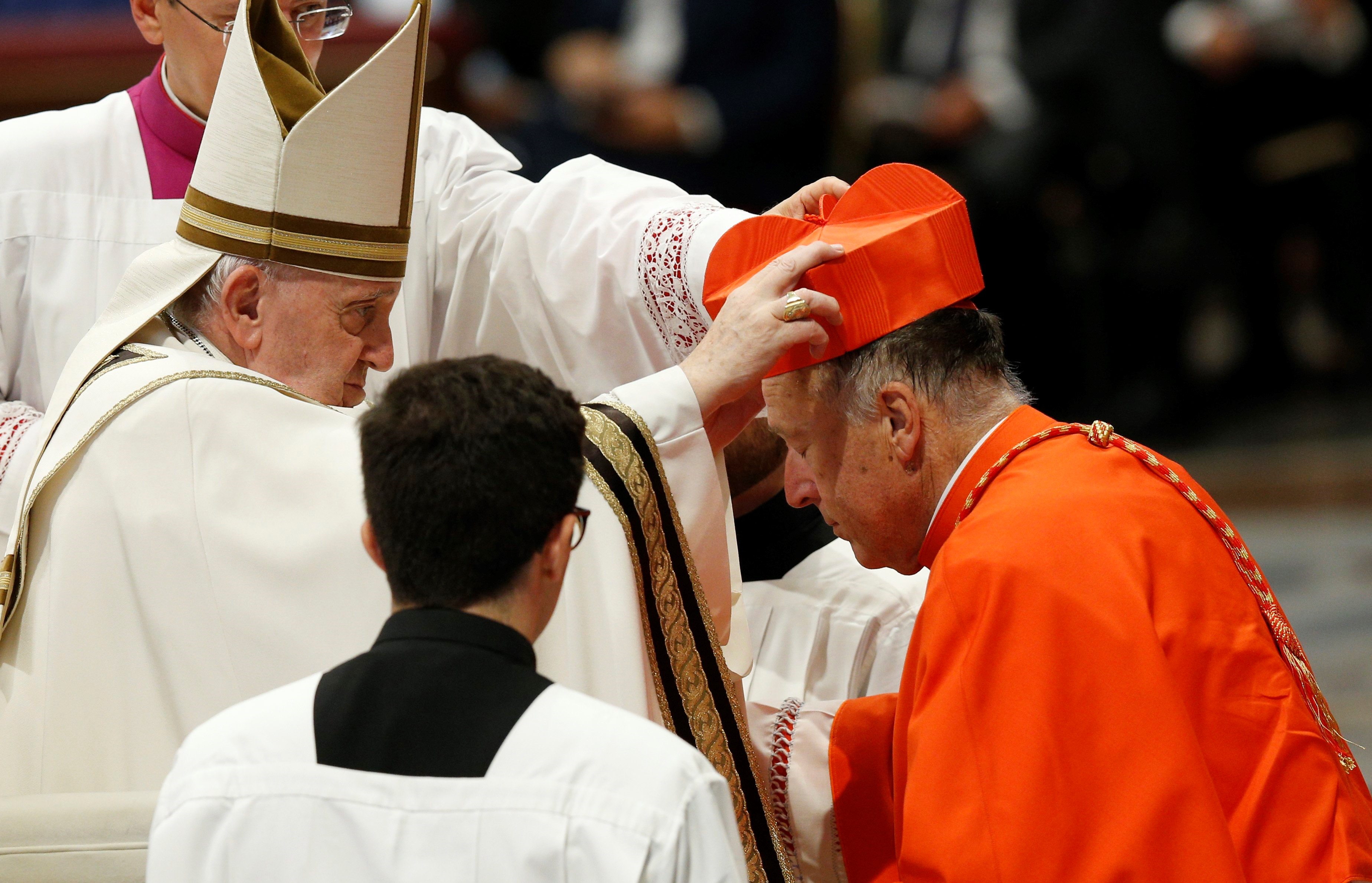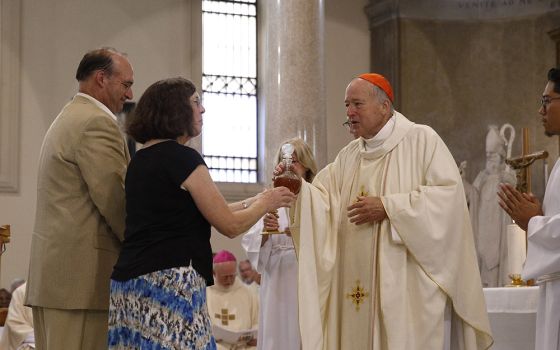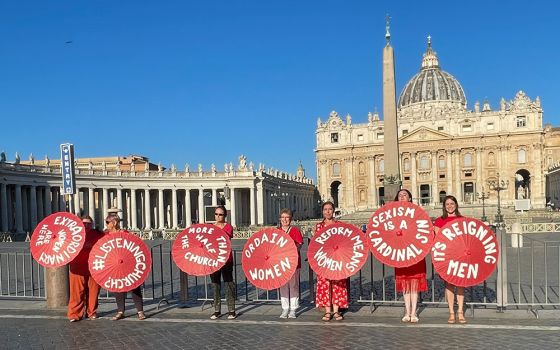
Pope Francis places a red biretta on new U.S. Cardinal Robert W. McElroy of San Diego during a consistory for the creation of 20 new cardinals in St. Peter's Basilica at the Vatican Aug. 27. (CNS/Paul Haring)
Pope Francis on Aug. 27 elevated 20 Catholic prelates from around the world — including San Diego's Bishop Robert McElroy — to the rank of cardinal, exhorting that those who are often referred to as princes of the church must instead exercise an "unassuming power" and preach the Gospel with an openness to all people "without exception."
"The Lord wants to bestow on us his own apostolic courage, his zeal for the salvation of every human being, without exception," Francis said. "He wants to share with us his magnanimity, his boundless and unconditional love, for his heart is afire with the mercy of the Father."
During the ceremony in St. Peter's Basilica, formally known as a consistory, the pope bestowed each new cardinal with a new signet ring and red hat, known as a biretta, and said their ministries, like that of the Apostle Paul and other missionaries of the Gospel, should be marked by the 'exhausting yet sweet joy of evangelizing.' "
Among their responsibilities, said Francis, is the work of "cooking the food of poor families, migrant and homeless persons" and possessing a "universal vision ever attentive to particulars."
"This, brothers and sisters, is the fire that Jesus came to 'bring to the earth,' a fire that the Holy Spirit kindles in the hearts, hands and feet of all those who follow him," the pope said.
Francis, who is 85 and dealing with persistent knee pain, arrived for the ceremony via wheelchair and remained seated throughout.
California's McElroy, who is now the seventh active residential cardinal in the United States, was joined by three Vatican department heads: British Cardinal Arthur Roche, who leads the Vatican's liturgy office; South Korean Cardinal Lazarus You Heung-sik, who leads the Vatican's clergy office; and Spanish Archbishop Fernando Vérgez Alzaga, who governs the Vatican City State.
In terms of geographic diversity, the pope also elevated five other bishops from Asia, including for the first time a cardinal from India’s Dalit community, formerly known as the "untouchables" within the Hindu caste system; three bishops from Latin America; and two African bishops.
The pope told the new cardinals their service to the church should be marked by the virtues of "meekness, fidelity, closeness and tenderness" in order to "lead many people to savor the presence of Jesus alive in our midst."
In remarks at the beginning of the event on behalf of all the new cardinals, Roche told the pope they shared in his "desire and commitment for communion in the church."
"From you, Holy Father, we learn to resist the temptation of any narrowness of mind and heart which shrinks to the size of self instead of expanding 'to the measure of the fullness of Christ,' " he said, adding: "Our mission today is to help you carry this cross and not to increase its weight."
Pope Francis leads a consistory for the creation of 20 new cardinals in St. Peter's Basilica at the Vatican Aug. 27. (CNS/Paul Haring)
The pope first announced on May 29 that he would create new cardinals at the end of August, originally announcing a total of 21 names.
In June, retired Bishop Lucas Van Looy of Ghent, Belgium, asked Francis to withdraw his appointment, and the pope agreed, following complaints over Van Looy's handling of clergy abuse cases.
The Aug. 27 ceremony is the eighth time Francis has created new cardinals. The last event took place in November 2021, in a part-virtual consistory at the height of the COVID-19 pandemic.
As of this consistory, 132 cardinals are under age 80 and thus eligible to vote in a papal conclave. Of those cardinal electors, 11 were named by Pope John Paul II, 38 by Pope Benedict XVI and 83 by Francis – meaning Francis has named over 62% of the men who will eventually elect his successor.
(This figure does not include Italian Cardinal Angelo Becciu, who remains a cardinal in title but renounced "the rights connected to the cardinalate" in Sept. 2020 due to a series of financial scandals for which he is now on trial at the Vatican.)
The College of Cardinals now consists of members from 89 countries. According to an analysis by the Pew Research Center, Francis has dramatically made the body more diverse and less European during his nearly decade-long papacy.
Since 2013, the percentage of European cardinals has dropped from 52% in 2013 to 40% in 2022. Consequently, there have been increases in Asia Pacific representation from 9% to 17%; sub-Saharan African from 9% to 12%; and in Latin American from 16% to 18%.
New U.S. Cardinal Robert W. McElroy of San Diego, right, and other new cardinals attend a consistory led by Pope Francis for the creation of 21 new cardinals in St. Peter's Basilica at the Vatican Aug. 27. (CNS/Paul Haring)
Francis has asked the world's cardinals to gather after the consistory for two days of meetings on Aug. 29-30 to discuss the Vatican's new apostolic constitution, Praedicate Evangelium, which reorganized the Roman curia, the Vatican's central bureaucracy.
Their meeting will mark the first time since 2015 that Francis has met with the full College of Cardinals. According to the Vatican press office, 197 individuals are expected to participate, including Eastern-rite Catholic patriarchs and a delegation from the Vatican's Secretariat of State.
McElroy — the first cardinal in the history of the San Diego Diocese — told NCR in an interview Aug. 25 that he believes there are two major purposes of the meeting: to discuss the orientation of the church's global leadership and to better understand the specific configuration of the Vatican's offices.
"Maintenance is not sufficient," he said of the inner workings of the Vatican. "Bureaucracies tend to fall into maintenance, we all do at some level."
By contrast, the new constitution, he noted, "emphasizes that active evangelization and missionary outreach and development are essential to the life of the church and to the curia."
Advertisement
In an Aug. 27 interview just ahead of the consistory, Roche offered a similar assessment, saying that the meeting is "not just about the way the curia works" but also "about the nature of the relationship of the pope with the bishops of the world and using this curia to be a bridge between the two."
"It also calls for transparency and for greater collaboration at an episcopal conference level and the individual bishop level with the See of Peter," Roche told NCR.
"If that gets across in this highly international, important meeting," he added, "I think it will be of great service to the Gospel."
The 16 new cardinal electors are:
- Arthur Roche, prefect for the Congregation for Divine Worship and the Discipline of the Sacraments;
- Lazarus You Heung-si, prefect of the Congregation for Clergy;
- Fernando Vérgez Alzaga, president of the Governorate of the Vatican City State and of the Pontifical Commission for the Vatican City State;
- Jean-Marc Aveline, Archbishop of Marseille, France;
- Peter Okpaleke, Bishop of Ekwulobia, Nigeria;
- Leonardo Ulrich Steiner, Archbishop of Manaus, Brazil;
- Filipe Neri António Sebastião di Rosário Ferrão, Archbishop of Goa e Damão, India;
- Robert McElroy, Bishop of San Diego, California;
- Virgilio Do Carmo Da Silva, Archbishop of Dili, East Timor;
- Oscar Cantoni, Bishop of Como, Italy;
- Anthony Poola, Archbishop of Hyderabad, India;
- Paulo Cezar Costa, Archbishop of Brasília, Brazil;
- Richard Kuuia Baawobr, Bishop of Wa, Ghana (unable to attend the consistory due to health issues);
- William Goh Seng Chye, Archbishop of Singapore;
- Adalberto Martínez Flores, Archbishop of Asunción, Paraguay; and,
- Giorgio Marengo, the Apostolic prefect of Ulaanbaatar, in Mongolia.
The new cardinals over the age of 80:
- Jorge Enrique Jiménez Carvajal, retired Archbishop of Cartagena, Colombia;
- Arrigo Miglio, retired Archbishop of Cagliari, Italy;
- Gianfranco Ghirlanda, a Jesuit, respected professor of theology and canon law, and a former rector of the Pontifical Gregorian University; and,
- Fortunato Frezza, a biblical scholar and Canon of St. Peter's Basilica.






